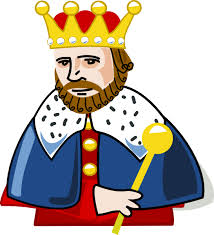king
英 [kɪŋ]
美 [kɪŋ]
- n. 国王;最有势力者;王棋
- vi. 统治;做国王
- vt. 立…为王
- adj. 主要的,最重要的,最大的
- n. (King)人名;(德、英、葡、捷、西)金;(中)金(普通话·威妥玛);(泰)京;(东南亚国家华语)京
使用频率:

记忆方法
1. 扑克牌中的K就是king的首字母缩略形式,代表国王。
中文词源
king 国王,君主,重要的,大的
缩写自古英语cyning,国王,君主,统治者,来自Proto-Germanic*kuningaz,对应于kin,家族,种族,氏族,-ing,集合名词后缀。即一个家族或氏族的统领,后用于指国王,君主。引申词义关键的,重要的,大的等。比较其与emperor的区别。
英语词源
- king
-
king: [OE] The prehistoric Germanic ancestor of king (as of German könig, Dutch koning, Swedish konung, and Danish konge) was *kuninggaz. This seems to have been a derivative of *kunjam ‘race, people’ (source of English kin). If it was, king means etymologically ‘descendant of the race, offspring of the people’.
=> kin - king (n.)
- Old English cyning "king, ruler," from Proto-Germanic *kuningaz (cognates: Dutch koning, Old Norse konungr, Danish konge, Old Saxon and Old High German kuning, Middle High German künic, German König). Possibly related to Old English cynn "family, race" (see kin), making a king originally a "leader of the people;" or from a related root suggesting "noble birth," making a king originally "one who descended from noble birth." The sociological and ideological implications render this a topic of much debate.
Finnish kuningas "king," Old Church Slavonic kunegu "prince" (Russian knyaz, Bohemian knez), Lithuanian kunigas "clergyman" are loans from Germanic.As leon is the king of bestes. [John Gower, "Confessio Amantis," 1390]
In Old English, used for names of chiefs of Anglian and Saxon tribes or clans, then of the states they founded. Also extended to British and Danish chiefs they fought. The chess piece so called from early 15c.; the playing card from 1560s; use in checkers/draughts first recorded 1820. Applied in nature to species deemed remarkably big or dominant (such as king crab, 1690s). In marketing, king-size is from 1939, originally of cigarettes.[I]t was [Eugene] Field who haunted the declining years of Creston Clarke with his review of that actor's Lear. ... Said he, "Mr. Clarke played the King all the evening as though under constant fear that someone else was about to play the Ace." ["Theatre Magazine," January 1922]
权威例句
- 1. The King made major concessions to end the confrontation with his people.
- 为了结束与其臣民的冲突,国王作出了很大的让步。
- 2. The king's indulgence towards his sons angered the business community.
- 国王对儿子们的纵容令商界恼火。
- 3. It is my destiny one day to be king.
- 我命中注定有一天要成为国王。
- 4. The King has merely given the politicians enough rope to hang themselves.
- 国王只不过是给了这些政客自缚的绳子。
- 5. The last French king was Louis Philippe, who abdicated in 1848.
- 法国末代国王是1848年逊位的路易·菲力普。
